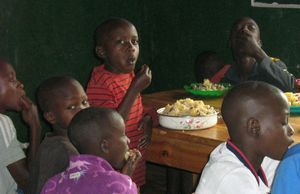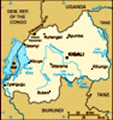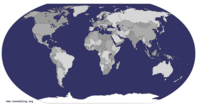Advertisement
Published: August 7th 2007

 SACCA's boys in Rwamagana
SACCA's boys in Rwamagana
Always tastes better when you cook it yourself!For children on the streets of Rwanda, is always a familiar story - abusive parents, lack of money for school fees or a uniform, being forced into manual labour in the home or conflict with step-parents, who often, according to the culture, cannot accept the child of a previous marriage and makes life unbearable for them. Equally common are the children who have been driven from their homes, and those who have no home. In this respect, Rwandan street children are nothing special, which is exactly how they feel, what is different is the sheer volume of cases.
The boys hang around the taxi-bus stations, steal in the market, beg from passers by. They do small jobs to earn their daily food, and spend what little they get on sweets and drugs. The girls walk the streets during the sunlight hours, waiting to be approached. After dark, it’s a little more organised, and they sell as much as they can of all they have to offer, basically themselves.
All any of the children really want is food, shelter, love, the chance of an education, somewhere to feel secure, and hope for the future. On

 One of the boys rooms
One of the boys rooms
It's two to a mattress - if you have one! the street, they are on their own: treated as social outcasts, they spurn the moral codes society requires and suffer the consequences in defiance and fear.
Every child deserves the chance to be good and to be a child. They just need someone to believe in them. We do, and we are delighted that you share our belief in these children and their future.
How it works... Sponsoring children offers them some stability. It means that whatever else may happen, the child is provided for. After living with the uncertainties of the street, having security - knowing where the next meal is coming from, being able to trust in someone and something - allows the children to relax and be what they really are: just young children.
Whilst any support you can give is invaluable to our children, we hope that you will feel able to sponsor a child for one year or more. The children we help all have different needs that change and develop as they progress through our programme. A child may start on our ‘core programme’, coming to the centre on a daily basis to wash, learn and eat and then, when

 Honorine (6mths)
Honorine (6mths)
Haven't touched the milk, honest! ready, go to school or commit to some form of vocational training.
Should you decide to sponsor one of our children, we will keep you informed of the developments in your child’s life, sending you regular reports, e-mails, photographs and updates on the child’s progress. The children themselves are more than happy to write about how their lives are changing, their latest football prowess, traditional dance competition or how they did in the end of term exams. We promise a high level of contact, and hope that you will come to care about your child as much as we do.
Costs … The level of sponsorship you provide is up to you. Different groups of children have different requirements according to whether they are on our ‘core programme’, ‘young mothers’ supporting their own children or one of our children in need of ‘special care’. However, all children have the same basic needs: food, water, clothes and medical treatment. These are the core costs that allow us to give the children the basic support from which to change their behaviour.
Core Programme This is the most basic level of support that we can give the

 Children in Primary One
Children in Primary One
How much do you like school?children. It is what we offer as an immediate step off the street. It is an initial programme in itself and the basis of anything further that we do, providing the children with a sense of security from which they can do their best to change their behaviour and standard of living.
For some children, this is all that is suitable at present. We provide the basic love and care that they need, teach them ourselves, allow them to change at their own speed, and prepare them to progress onto further, more formal schooling or training when they are ready. Your support includes food and health costs, medical insurance, bedding a school uniform and basic school books - essential for the child to get the start in the local government school system he or she so needs.
School Children In Rwanda, as in the rest of the world, schooling is vastly important. Education is the key to escaping poverty, the benefit being not only the child’s education, but the huge boost to their self-esteem, their change in behaviour, and their acceptance into normal society. Having a beige uniform and going off to school with the other pupils is

 Elly and Emmanuel, both 7
Elly and Emmanuel, both 7
Who said you can't get kids to eat their vegatables? vitally significant to our children. Our 18 & 19 year olds happily walk off into Primary One with our twelve year olds. In class, the street children blend in; they are no longer outside, different and looked down on by everyone else.
As with everything else in Rwanda and unlike the UK, schooling isn’t free. The cost of sending a child to school grows quickly beyond the reach of many families when school uniform, books, pens and the few school trips are added. Without these a child is refused entry and sent home. Secondary schools in Rwanda are all boarding and therefore fees are significantly higher than that the cost of Primary. Attendance levels reflect this, with less than 4%!c(MISSING)ompleting secondary education.
Vocational training Our main aim in working with the children is to make them independent, both emotionally and financially. We offer them the chance to succeed in the belief that with support, they can fulfill their potential. A number of the older children for whom school is not suitable are currently enrolled in formal or informal vocational training.
If these children can read and write to a reasonable level, are responsible and capable

 Falida and Fred
Falida and Fred
Mother and Son & Best Buddies of following a highly structured course content, we find places for them in vocational schools. These train in a profession, giving them skills that will later find them a job, and provide them with a full qualification. However, many of the boys were on the street for years and never had a chance to learn to write and find structured study difficult to sustain. We enrol these children on informal training courses with local tradesmen. The principle extra costs with these children are training fees, materials and tools.
Whilst we would not expect you to cover the full costs of educating a child, rest assured your contribution is the last vital element that enables a child start their education.
Core Programme - 7000 RFr. or £6.50 each month. Girls (and sometimes Young Mothers) Unable to survive by carrying loads or doing other arduous manual work, most street girls are forced to turn to prostitution. They are vulnerable to rape and HIV, and the community shuns them. Their problems are complex, accentuated by babies, illness, and their hidden position in society.
By sponsoring a girl you provide the support she needs to be able to

 Suleiman
Suleiman
When I asked what he wanted to be when he was older, he said 'a husband'! take care of her children herself - and prevent them becoming the next generation of children on the street. Your donation provides all the basics plus assistance towards house rent and ‘mutuelle’ (local health insurance).
Alice (12) - After Alice’s parents were killed in the Genocide she fled to Uganda to live with extended family. Sadly whilst in their care she had to endure life of abuse and abandonement, often shunned by both her step parents. Finally when she could take it no more, she returned to Rwanda to live with an older sister. Further neglect led to a gangrous infection in both feet, which has recently resulted in amputation. Further complicated by the discovery that Alice is HIV+. Likely to be as a result of the years of abuse in Uganda. Sponsorship will mean Alice can receive specialist orthepedic care along with the appropriate local schooling, otherwise her life would be unthinkable
Young Mothers Programme - 9,500 Rfr. or £8.65 each month Children requiring ‘Special Care’ Given their backgrounds, most of our children are remarkably well adjusted; however some do require special care.
Suleiman (15) has epilepsy. Prior to joining SACCA, Suleiman

 The boy with no name!
The boy with no name!
and Im not kidding!!was ‘kept’ by a group of old men who amused themselves by plying him with alcohol and watching his drunken antics. Abandoned by his extended family following the death of his parents, and a chronic alcoholic by the age of ten, Suleiman scraped a living begging, and capering for others’ amusement. Although he has successfully weaned himself from his addiction, Suleiman’s chronic epilepsy means he needs constant monitoring, drugs and loving attention. His harsh childhood has left him with the physical stature of a small child and the mental capacity to match. The price of essential medicines and increased carewould increase the cost of sponsoring a more vulnerable child like Suleiman.
Mukunzi (15) began to act strangely aged seven, at which point his father left home, saying the child was mad, and he couldn’t possibly have fathered someone so ugly. Mukunzi began to roam the streets begging for food rather than remain at home where his mother, who does not have time to give him the attention he requires. This itinerant habit puts Mukunzi at risk of frequent beatings and his feet have been permanently damaged by a particularly vicious knife attack. His behaviour is often socially unacceptable, but
we truly feel that this is predominantly learnt rather than inherent. A dedicated caregiver could focus his attention towards routines for personal hygiene and daily life, as well as developing his love of mimicry and drawing into functional numeracy and literacy. It would enable us to strengthen the relationship he has with his mother (whom he visits frequently) by encouraging him to spend each weekend with her after being at SACCA’s Kayonza centre during the week.
Special Care Programme - 9,500 Rfr. or £8.65 each month
The Streets Ahead Children’s Centre Staff
Our project would never function without the dedication, enthusiasm and sheer hardwork of our amazing staff. We don’t like to include our salaries or administration costs in the child sponsorship calculations, feeling you would prefer your donation to go directly to supporting the children. However, salaries do need to be paid, and administration needs to be done, and without the staff there would be no-one to run the centres! In my opinion they’re priceless. So, we think it is right to inform you that there is a small element of your sponsorship that is allocated to these costs. I hope you 
 Valentine
Valentine
Sponsorship Coordinator and very a nice person with itunderstand.
Thank you again for giving consideration to the sponsorship of one of our children. We really hope you decide to become one of the family.
Please contact me directly on najennings@btinternet.com , if you would like further details
Advertisement
Tot: 0.146s; Tpl: 0.013s; cc: 5; qc: 65; dbt: 0.063s; 1; m:domysql w:travelblog (10.17.0.13); sld: 1;
; mem: 1.2mb











followsarah
Sarah
More information.
I am sitting here at the Union Trade Center Cyber Link in Kigali Center reading your story. I have been able to see the incredible wealth as well as the devestating poverty in this beautiful country. Does SACCA have a website? I would love more information. Thanks, Sarah.